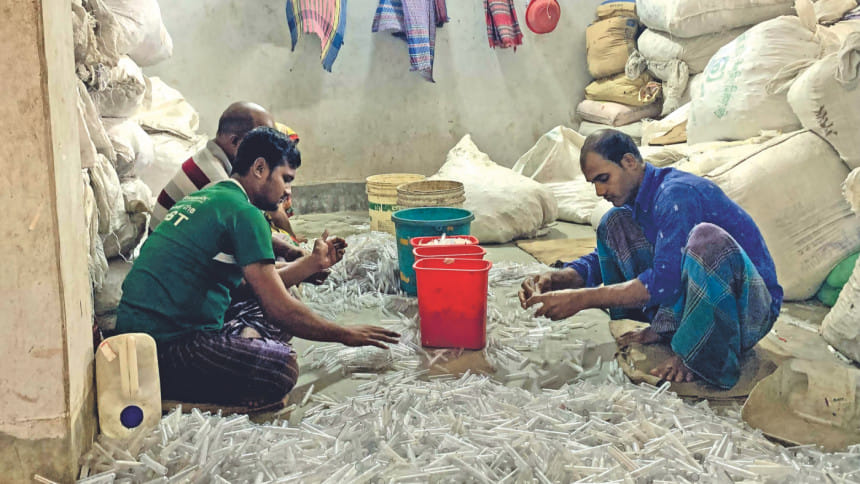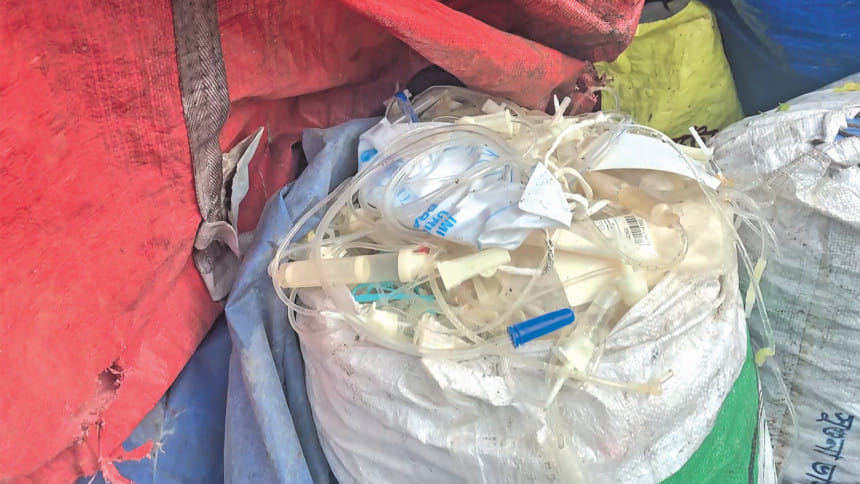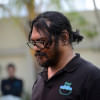Safety takes a back seat

In Bangladesh, infectious medical waste has never received adequate attention in spite of the growth of many hospitals, clinics and other facilities. On October 28, The Daily Star published a report that showed how untreated medical waste is accumulating in landfills in divisional cities, posing a serious threat to public health. But what is happening in the capital?
The Daily Star investigations reveal a shocking picture of medical waste mismanagement in the city. A huge illegal business profiting off of unsafe medical waste has developed over the years under the very nose of the authorities. Only a quarter of infectious medical waste is being sterilised properly. The rest is going directly from the hospitals to the black market to be used as recyclable plastic.
It is quite possible that such mismanagement is causing disease amongst waste cleaners, waste pickers, collectors, and recycling waste operators. The risk for the general public is also significant. The overall picture is quite alarming. It is high time the authorities paid proper attention to this sector.
A worker hacks away at a pipe-like object at a small scrap shop in Old Dhaka’s Islambagh. The sound of his hammer crashing against the pipe is instantly followed by bits of plastic flying off in all directions. Flecks of yellow and red tint the air.
Although the object being cut is without a label, it is clear that it was a dialyser meant for filtering the blood of kidney-disease patients.
The plastic pieces salvaged from it would change hands a few more times, before being recycled, perhaps into a jug.
Though recycling is to be encouraged, in this form, however, it is quite alarming.
Unauthorised, unregulated recycling of medical wastes can cause spread of infections like hepatitis A and B, or something even more serious, according to experts.
A matter of grave concern is that hospitals are a source of superbugs resistant to commonly used antibiotics and such handling of medical wastes helps spread those superbugs, said Prof ABM Faruq, of Dhaka University’s pharmaceutical technology department.
The small shop in Islambagh, innocuous at first glance, is part of a thriving black-market industry which has grown by taking advantage of an ineffective system put in place in 2005 to ensure safe disposal of medical wastes.
In this industry, safety takes a back seat to money-making. The whole operation is run by a syndicate of hospital staffers, collectors of recyclables, scrap shop owners and recycling businesses. The lack of monitoring by the authorities is an added benefit for them.
To tackle the problem, a non-profit organisation, PRISM Bangladesh Foundation, has been made legally bound to manage medical waste in Dhaka since 2005.
It received approval from the Department of Environment (DoE) and has been functioning under the supervision of the Dhaka city corporations; a primary condition of the approval is that it does not cause any harm to public health or the environment.
A month-long investigation by The Daily Star has found that the recyclable medical wastes PRISM collects from about 1,000 healthcare facilities across Dhaka is a small portion of the total waste generated.
Sohrab Ali, of Dhaka metropolitan office of the DoE, said his office mainly monitor and ensures management of all sorts of wastes from hospitals.
“It is done as per the agreement between the city corporations and PRISM.”
But DoE, periodically monitor solid waste, liquid waste management and even air and noise pollution caused by the generators of the hospitals. The hospitals have to fulfill all criteria to get the clearing certificate from DoE.
STAGE ONE
Visits to government and private hospitals, scrap shops which sprawl across Old Dhaka, and interviews with people representing all stages of this industry shed light on how much of the unaccounted medical plastics reach the black market.
According to PRISM, it operates following the core guideline on medical wastes of the World Health Organization and in compliance with the Medical Waste Management Rules, 2008.
The rules formulated under Bangladesh Environment Conservation Act 1995 requires healthcare facilities to segregate wastes into three categories -- infectious, sharp and recyclable waste.
PRISM is to collect the waste from the facilities separately and transport those in closed containers to a treatment plant in Dhaka’s Matuail. Sharp and infectious waste materials are to be incinerated and disinfected before being disposed of.
Only plastic items -- syringes, saline bags, gloves, etc -- are chemically treated to free those of germs and then shredded into micro plastics at the PRISM plant before being sold.
There is no official data on how much medical waste is generated in the capital on a daily basis.
PRISM, during a survey in 2018, estimated that at least 4,000kgs of plastic medical wastes is generated in Dhaka city every day. But PRISM only gets 500kgs of plastic items a day (as its data shows), which means more than 87 percent slips through the system.
Where do the missing medical plastic wastes end up?
FROM WASTE TO WHAT?
A six-feet-by-ten-feet scrap shop beside a narrow alley close to the Eidgah Ground in Islambagh might be one of the answers to where medical wastes go.
Shop owner Khalil Mian said he buys about 7,500kgs of saline bags at Tk40 a kg every month. The plastic is then scrapped. He sells those for Tk60 a kg.
It’s a small mark-up, but the quantity sold more than makes up for it.
At the narrow alley near the Eidgah Ground, at least 20 such scrap shops can be found, inconspicuously located between hole-in-the-wall restaurants and tailors.
At another such shop, two women were seen cutting blood and urine bags with their bare hands. They said the plastic pieces would be cleaned in another place.
Moving onwards, a 10-minute walk out of the alley towards the road by the Buriganga river would take one to the scrap shop of 73-year-old Nurul Islam. There, more dialysers can be seen being cut into pieces on the ground floor of a three-storey structure. Nurul rented out the remaining two floors to another businessman.
Climbing up the incomplete staircase to the second and third floors, the correspondents stumbled over piles of “collection tubes” that laboratories use to keep samples of blood and urine.
Five to six people were busy removing labels and cleaning those.
Asked about the next destination of those tubes, Majnu Miah, an employee, said only their boss knew the answer to that.
“I should not talk to you as there are CCTV cameras mounted here. We would be rebuked if seen talking to you,” he said in a hushed tone.
SUPPLY CHAIN OF USED MEDICAL ITEMS
The lure of making money encourages hospital staffers to move aside plastic materials from other waste and keep those under their care. This becomes easy since most of the facilities don’t have designated waste management officials, although it is required by the 2008 rules, according to PRISM.
On the footpath opposite Dhaka Medical College Hospital (DMCH), medical plastics were found stowed under the cover of a tarpaulin, beside tea and other roadside food stalls.
Staffers who handle general wastes of DMCH and small vendors nearby said the plastic items had already been sold at Tk 25-30 a kg. The man found to be handling the items there said his cousin was the one running the business.
The trial ended there.
Brig Gen AKM Nasir Uddin, director of DMCH, said the hospital was trying to improve its waste management over the last one and a half months.
“We had discussions with ICDDR,B and began trying to implement the decisions that came up.”
A team of 16 people is now deployed at the hospital to collect hazardous waste twice from different units and to seal the cracks through which plastic wastes go to the wrong hands.
When questioned about negligible plastic waste that Mitford generated every day as per records, ward master Sazzad Hossain said plastic items like saline bags that were supplied from the hospital’s medical store were not given to PRISM. Those were dealt with separately.
But Abdur Rahman, who oversees the operation of the store, says all medical plastics are given to PRISM.
Posing as a hospital staffer, these correspondents tried to find more about the medical waste industry.
At least half a dozen waste collectors agreed to buy plastic wastes in bulk at Tk 25-30 a kg. They said they were deployed area-wise to collect waste and sell those to scrap shops in their respective areas.
At Ananda Bazar and Islambagh, comparatively larger scrap shops buy items like syringes and saline bags in large quantities from small traders at Tk 60-70. A young man named Rana, in his twenties, said he would pay well if the items were clean.
Mazharul Islam, PRISM programme coordinator, claimed medical waste falls in the wrong hands because of “fourth-class employees” at government hospitals.
Though he didn’t mention who were to take the blame in case of private hospitals, he said mismanagement of wastes took place because of top officials not paying any heed to the matter.
“Waste is not a concern for them,” Mazharul added.
Mohammad Selim, office secretary of the association of plastic flakes businessmen in the capital’s Urdu Road, said medical plastics were transparent and of good quality.
“There is a good demand for those in the recycling market.”
While medical plastics are sold for a minimum of Tk 60-70 at scrap shops, drinking water bottles go for nearly half that price, Selim said, adding that the plastics are recycled in factories of shoe, furniture and kitchen utensils.
The scrap shops cut the plastic items into pieces and then the pieces would be shredded into flakes.
In Urdu Road, there are around fifty small factories that appear to be residential units from outside, processing flakes into pellets. The alleys ring loud from the constant roars of the machines inside the factories.
Plastic pellets of different qualities and colours are showcased at shops lined up by the roads, not very far from those factories, where the roars from the machines fade and are replaced by the honks of vehicles.
By the time pellets are moulded into finished products, the price rises to Tk 90 a kg, Selim said.
Looking at white rice-grain-sized flakes and pellets in Urdu Road, it is impossible to track those back to medical wastes.
They are brand new products unto themselves and their origins are left unexplored. And then it becomes business as usual.

1. Hospitals generate plastic waste that is recyclable. 1,000 public and private hospitals across Dhaka city generate 4,000 kg of plastic waste like used syringes, saline bags, urine bags, blood bags, and gloves, every day.
2. Only 500 kg of the total plastic waste goes to PRISM, the authorised body to get those treated and disposed.
3. The remaining 3,500kg goes to the black market.
4. Jonny Miah, a big shot in the black market, gets medical plastic from PRISM and the black market as well. He gets 30 tonnes of plastic waste a month; 14-15 tonnes from PRISM and the rest from illegal channels.
5. Around 120 tonnes of plastic waste goes to many small players every month.
6. The final destination for the waste is manufacturing units that use the plastic to produce footwear, utensils, furnitures.


 For all latest news, follow The Daily Star's Google News channel.
For all latest news, follow The Daily Star's Google News channel. 



Comments